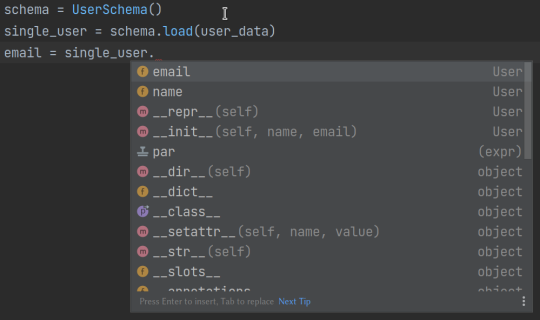stacklevel when warning about schema-wide many setting depending on initialization state.
marshmallow-generic
Generic schema with full typing support and minimal boilerplate
Documentation: daniil-berg.github.io/marshmallow-generic
Source Code: github.com/daniil-berg/marshmallow-generic
Extension for marshmallow to make deserialization to objects easier and improve type safety.
The main GenericSchema class extends marshmallow.Schema making it generic in terms of the class that data should be deserialized to, when calling load/loads.
With GenericSchema there is no need to explicitly write post_load hooks to initialize the object anymore. 🎉
If the "model" class is (for example) User, it just needs to be passed as the type argument, when subclassing GenericSchema. The output of the load/loads method will then be automatically inferred as either User or list[User] (depending on whether many is True or not) by any competent type checker. ✨
Usage Example
from marshmallow_generic import GenericSchema, fields
class User:
def __init__(self, name: str, email: str) -> None:
self.name = name
self.email = email
def __repr__(self) -> str:
return "<User(name={self.name!r})>".format(self=self)
...
class UserSchema(GenericSchema[User]):
name = fields.Str()
email = fields.Email()
user_data = {"name": "Monty", "email": "monty@python.org"}
schema = UserSchema()
single_user = schema.load(user_data)
print(single_user) # <User(name='Monty')>
json_data = '''[
{"name": "Monty", "email": "monty@python.org"},
{"name": "Ronnie", "email": "ronnie@stones.com"}
]'''
multiple_users = schema.loads(json_data, many=True)
print(multiple_users) # [<User(name='Monty')>, <User(name='Ronnie')>]
Adding reveal_type(single_user) and reveal_type(multiple_users) at the bottom and running that code through mypy would yield the following output:
# note: Revealed type is "User"
# note: Revealed type is "builtins.list[User]"
With the regular marshmallow.Schema, the output of mypy would instead be this:
# note: Revealed type is "Any"
# note: Revealed type is "Any"
This also means your IDE will be able to infer the types and thus provide useful auto-suggestions for the loaded objects. 👨💻
Here is PyCharm with the example from above:
Installation
pip install marshmallow-generic
Dependencies
Python Version 3.9+ and marshmallow (duh)
